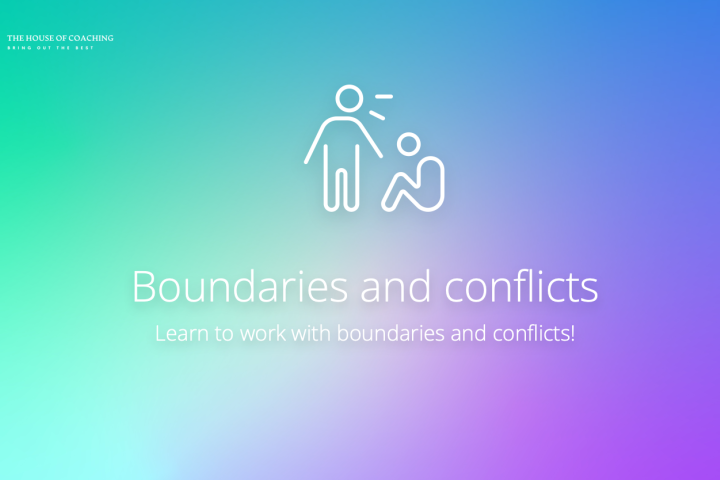Boundaries and Conflicts
Have you ever found yourself in a difficult situation at work where boundaries were crossed? Or have you ever faced conflicts within your team that just didn't seem to be resolved? We understand that dealing with boundaries and conflicts can be a challenging task, which is why we would like to invite you to our training course "Dealing with Boundaries and Conflicts".
During this two-day workshop, specifically designed for executives, we will equip you with practical tools and skills to effectively navigate these problematic situations. We will focus on two essential modules that will help you set boundaries, address transgressive behaviour and resolve conflicts in a constructive way.
Module 1: Boundaries, Cross-Border Behaviour and Assertiveness
During the first module, we explore the importance of personal and professional boundaries and how they can be crossed. We focus on recognising and understanding different forms of transgressive behaviour and their impact on individuals and teams. You will also learn how to be assertive and communicate your boundaries effectively. This module provides practical tools and techniques to enhance assertiveness so that you can better handle challenging situations and conflicts.
Learning objectives:
- Understand the function of boundaries, both in personal and professional contexts.
- Recognise and name different forms of transgressive behaviour.
- Strengthen assertiveness and develop the skill of communicating boundaries effectively.
- Apply strategies to deal constructively with challenging situations.
- Create a respectful work environment where boundaries are respected.
Learning programme:
- Introduction to boundaries and transgressive behaviour
- Definition of boundaries and their role in professional contexts
- Causes and consequences of transgressive behaviour
- Application of principles from social science to understand transgressive behaviour
- Identification and understanding of personal boundaries
- Reflection on personal values and boundaries
- The importance of setting and maintaining personal boundaries
- Integrating positive psychology principles to promote resilience and self-care
- Recognising and naming transgressive behaviour
- Analysis of different forms of transgressive behaviour in professional settings
- Practical examples and case studies to recognise transgressive behaviour
- Role-playing and dialogue exercises to respond assertively to transgressive behaviour
- Strengthening assertive communication
- Techniques for assertive communication and setting boundaries
- The importance of non-verbal communication and body language in assertive behaviour
- Practical exercises to develop and apply assertiveness
- Creating a respectful work environment
- The importance of leadership in fostering a respectful culture
- Practical strategies to create an inclusive and supportive work environment
- Team discussions and group exercises to encourage positive interactions
Module 2: Conflict management
In the second module, you will learn skills and strategies for dealing effectively with conflicts in the workplace. We discuss the different types of conflicts and their root causes. You will learn how to recognise, analyse and resolve conflicts in a constructive way. We also cover communication techniques and negotiation skills you can apply to reach lasting solutions. This module will help you promote a positive and productive work environment by dealing with conflicts effectively.
Learning objectives:
- Identify different types of conflicts and understand their causes.
- Analyse the dynamics of conflicts and discover the underlying factors.
- Apply effective communication techniques to address conflicts constructively.
- Strengthen negotiation skills and find win-win solutions.
- Manage emotions and stress during conflict situations.
Learning programme:
- Introduction to conflict management and conflict types
- Definition of conflict management and its role in leadership
- Identification of different conflict types and their characteristics
- Social science perspectives on conflict and principles of positive psychology
- Analysis of conflict causes and dynamics
- Identification of common causes and triggers of conflict
- Understanding power relations and their influence on conflicts
- Case studies and real-life examples to analyse conflict causes
- Effective communication during conflicts
- Active listening and empathetic communication during conflict situations
- Constructive feedback and avoiding defensive reactions
- Dialogue exercises and role plays to develop effective communication skills
- Negotiation techniques and collaboration
- Principles of principled negotiation and win-win solutions
- Promoting cooperation in conflict and building trust
- Practical scenarios and simulations to apply negotiation skills
- Managing emotions and stress during conflict situations
- Develop strategies to manage emotions and stress during conflict situations
- Effectively managing tension and pressure in conflict situations
- Practical techniques for emotional regulation and stress reduction
- Implementation of self-care measures to remain resilient during conflict
With this learning programme, as a manager, you will be able to effectively address conflict, promote constructive communication and create a positive work environment where conflicts are resolved in a productive manner.
Why choose the Coping with Borders and Conflict training programme?
Practical and focused approach:
Designed specifically for executives, the course provides immediately applicable knowledge and skills that you can use in your daily work.
Experiential learning experience:
The training uses various learning methods, including group discussions, role plays and practical exercises. This ensures an interactive and engaging learning experience.
Direct impact on the working environment:
By applying the acquired knowledge and skills, you can bring about positive change in dealing with boundaries, conflict and assertiveness within your team and organisation.
Invest in your role as a manager and develop the necessary skills to deal effectively with boundaries and conflict in your professional environment.
Experiential Learning at The House of Coaching
The House of Coaching stands for experiential learning. As a participant, you continuously engage with theory through practical, experiential exercises that teach you to apply your skills in real situations. We facilitate the learning process through maximum interaction and sharing of experiences. That's learning that really sticks!

Would you like to develop these 21st Century Skills for your people, team or organisation?
Then get in touch with us and we'll work out a programme together!
| Program category | |
|---|---|
| Program type | |
| Program languages | |
| Number of modules |
2
|
| Number of participants |
6 - 12
|